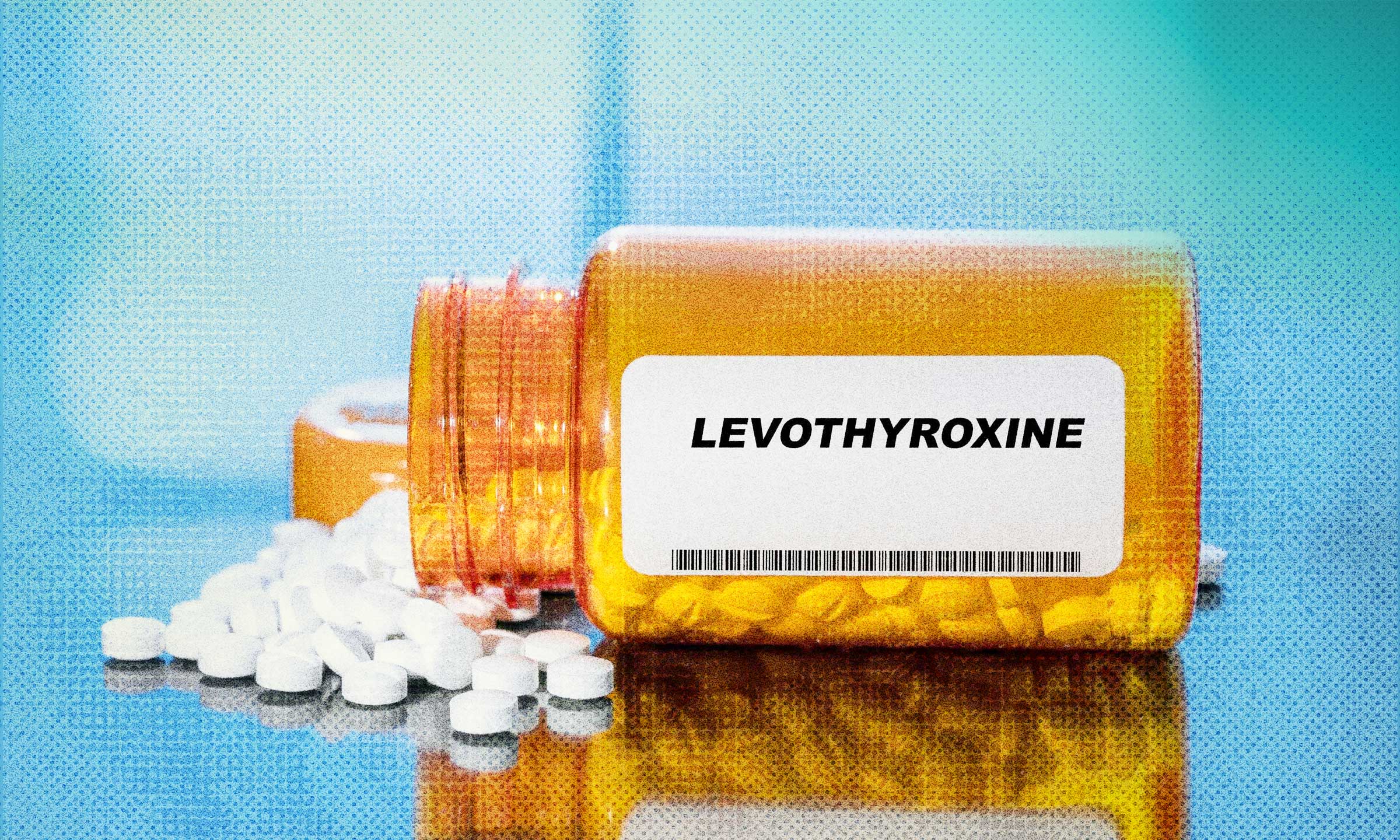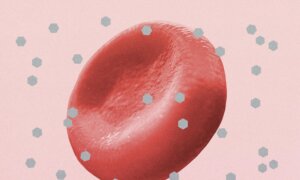A recent study from Johns Hopkins University (JHU) School of Medicine linked one of the most commonly prescribed medications for older adults—levothyroxine for low thyroid—to an increased risk of bone loss. Low thyroid levels, called hypothyroidism, happen when the thyroid does not produce enough hormones.
However, Dr. Jacob Teitelbaum, a board-certified internist physician and nationally known expert in chronic fatigue syndrome, disagrees with the findings, telling The Epoch Times in an email that they could fuel misinformation that may put people’s lives at risk.
He said that if people have had their thyroid glands removed because of cancer or other causes, they need to take prescription thyroid hormone for the rest of their lives. In contrast, he noted that natural options to improve thyroid hormone levels are reasonable for many individuals.
Misleading Findings?
The study results that associated bone loss with levothyroxine were alarming because roughly
7 percent of people in the United States take it daily, according to a
press release from the Radiological Society of North America. According to Teitelbaum, there is no cause for alarm, as he refutes the study unambiguously.
“The reporting I am seeing in the brief summary is, I suspect, dangerously misinforming doctors and the public,” he said.
He said his main concern is that the study may result in a lack of treatment for those who need it.
Researcher Dr. Shadpour Demehri, professor of radiology at Johns Hopkins, told The Epoch Times in an email that this could happen if someone misinterprets the findings.
“I completely agree with the possible risk of misinterpretation of our presentation among the general population, especially those patients who are in clear need of thyroid hormone replacement, such as in those with frank hypothyroidism or prior thyroid gland removal,” Demehri said.
Demehri said that the findings, based on observational data, are an association rather than a cause. He explained that the data pertained exclusively to older adults, pointing out that aging links to a higher prevalence of subclinical hypothyroidism and that untreated subclinical hypothyroidism of older adults often reverts to normal. Because of these factors, aggressive thyroid screening in this age group, especially those with weakness and tiredness, may lead to overtreatment, he said.
Faulty Reasoning?
“What the JHU study summary says is that if you follow people on thyroid hormone, they are more prone to loss of bone density,” Teitelbaum said
. “Actually, this is to be expected, since the main cause of low thyroid, an autoimmune condition called Hashimoto’s disease, is associated with bone loss independent of thyroid treatment.”
He cites a study published in Reviews in Endocrine & Metabolic Disorder to support his assertion.
To illustrate what he regards as incorrect reasoning, Teitelbaum provides the following analogy: People with high blood pressure are more likely to have heart attacks. If scientists conducting research on individuals taking blood pressure medications observed that they have more heart attacks than those who do not take them, it would be faulty reasoning to conclude that the medications were the cause of the heart attacks. Such a conclusion would ignore the effect of the high blood pressure itself. Likewise, he said, since the JHU study ignored the fact that the main cause of hypothyroidism causes bone loss, the findings are pretty meaningless.
Demehri discussed Teitelbaum’s comments on the connection between blood pressure and heart attacks, mentioning the potential confounders in interpreting observational data. Confounders in research are factors separate from the outcomes being studied that could affect the results.
“His point, in general, is valid, and that is why we addressed those variables in our results,“ he said. ”However, the observational nature of our work cannot preclude that unknown potential confounding variables could impact the results.”
He concluded that this is why the researchers couldn’t determine causality in the results and why further research is needed.
Wrong Dosage?
Additionally, Teitelbaum pointed out that the findings do not factor in the difference dosage makes. Does the normal dosing of thyroid hormone cause significant loss of bone density?
“The study shows something we have known and that I have discussed for decades,” he said. “Keeping what is called the free thyroxine level in the top 15 percent of the normal range, which is much too high for most people, does cause loss of bone density. Conversely, keeping the level in the normal range but below the top 15 percent does not. Consequently, the reporting and conclusion are grossly misleading.”
Datis Kharrazian, a clinical research scientist and renowned functional medicine health care provider, agrees that dosage is a key factor in whether levothyroxine causes bone loss.
“When levothyroxine is dosed appropriately to maintain thyroid stimulating hormone (TSH) within the reference range, the risk of adverse effects, including bone loss, is minimized,” he told The Epoch Times in an email.
Overtreatment with levothyroxine has been associated with bone density reduction, particularly in postmenopausal women who may also be deficient in the sex hormones necessary to protect bone health, Kharrazian added.
“The JHU study also emphasized the importance of managing the underlying condition, Hashimoto’s disease. This can prevent the need to continually increase the dose to account for the increasing loss of thyroid tissue to autoimmune attacks,” he said.
Who Needs Levothyroxine?
Having normal thyroid hormone levels is essential, as it affects nearly every organ in the body,
according to the National Institutes of Health (NIH). Hypothyroidism slows down bodily functions, and if thyroid hormone levels are low enough, the slowing down of organ function can have serious and potentially life-threatening complications if untreated.
Teitelbaum said that it is important for those who have had their thyroid gland removed or who have critically low thyroid levels for other reasons to take levothyroxine or another prescription-strength thyroid hormone.
What about those who have suboptimal but not critically low levels? Teitelbaum said that many people fall into this category and stated that it is reasonable for them to try natural options if they desire. Those who try a natural method should remain under a doctor’s care so they can get a prescription for thyroid hormone replacement if such methods prove unsuccessful within an acceptable timeframe.
Misdiagnoses
According to Teitelbaum, some people who need the medication may not have received a prescription for it because of murky diagnostic criteria.
“There are major disagreements about defining who needs thyroid,” he said. “For standard physicians, the definition is having an elevated TSH level. The problem is that the TSH test is very unreliable, and designations of ‘abnormal’ levels may not be quite accurate.”
Teitelbaum explained that because of these and other factors, some people with hypothyroidism may not receive a diagnosis or treatment, even if they have crippling hypothyroidism symptoms.
“To many endocrinologists, thyroid treatment in such cases is unnecessary regardless of whether it could take the person from bedridden and in pain to normally active,” he said. “When treatment is necessary, doctors should use the lowest dose with the greatest benefit, while keeping thyroid levels in the mid-range for safety.”
On the other hand, Teitelbaum discussed how some people, especially older adults, may take levothyroxine much longer than necessary because of a failure to discontinue the medication when it is no longer required.
“Many seniors take over a dozen medications and may not need most of them. Because Medicare does not pay for the time required to assess the need for continuing a medication, and it is legally risky to stop anything, unnecessary medications are simply not stopped,” he said.
Possible Alternatives
The NIH noted that taking iodine supplements or eating foods rich in iodine can transiently worsen hypothyroidism in some people with Hashimoto’s disease. Conversely, having too little iodine is far more likely to cause or worsen hypothyroidism, Teitelbaum said. He recommended that people seek advice from a holistic doctor about whether to avoid or increase their iodine intake.
Additionally, several natural measures may potentially improve thyroid function.
“Addressing hypothyroidism naturally calls for a multifaceted approach, tailored to support the body’s inherent healing mechanisms,” Jamie Bacharach, a diplomate of acupuncture at Acupuncture Jerusalem, told The Epoch Times in an email.
These include:
- Nutrition: Selenium aids in thyroid hormone metabolism, so incorporating foods into the diet that are high in the mineral, such as Brazil nuts, can be beneficial. For those with Hashimoto’s disease, a gluten-free diet may decrease inflammation and potentially benefit thyroid health.
- Supplements: Regular monitoring of vitamin D and B12 deficiencies is crucial, as supplementation might be needed to support thyroid health.
- Lifestyle Modifications: Stress management may help because chronic stress can inhibit thyroid function. Regular moderate exercise can promote thyroid health by enhancing circulation and metabolic rate. Sufficient sleep is vital for hormonal balance and overall health.
- Gastrointestinal Health: The emerging concept of the gut-thyroid axis suggests that improving gut health could have a positive effect on thyroid function. Probiotics and a high-fiber diet are recommended.
“While these methods can aid in symptom management, they should not be used to replace medications without consulting a doctor,” Bacharach said. “Continuous monitoring of thyroid hormone levels and consultation with your healthcare team will ensure a safe and effective plan.”
Causes of Low Thyroid Function
The NIH lists the following causes of hypothyroidism:
Hashimoto’s Disease
Hashimoto’s is an autoimmune condition that causes the immune system to attack the thyroid gland. It causes inflammation and results in the inability of the gland to produce enough thyroid hormones.
Thyroiditis
Thyroiditis is inflammation of the thyroid, a condition that causes stored thyroid hormones within the gland to leak out. It may result in thyrotoxicosis, which refers to high levels of thyroid hormones. If this persists for many months, it can lead to hypothyroidism and become permanent over time.
Surgical Removal
Partial removal of the thyroid can sometimes result in hypothyroidism, while total removal of the thyroid always results in the condition. Doctors may recommend partial or total removal for treatment of various disorders, such as too much thyroid hormone production—called hyperthyroidism—a large goiter, and cancerous or noncancerous thyroid tumors.
Congenital
Babies can be born with a thyroid gland that either hasn’t developed fully or doesn’t function properly, which would cause hypothyroidism. If untreated, it can lead to intellectual disability; however, early treatment can prevent it.
Medications
Certain medications can suppress thyroid hormone production, including some for bipolar disorder and heart conditions. Additionally, some cancer medications may have a negative effect on the thyroid gland directly, or they may damage the pituitary gland, which could have an indirect negative effect.
Radiation Treatment of Thyroid
A common treatment for hyperthyroidism, radioactive iodine, gradually destroys thyroid cells, which ultimately leads to hypothyroidism. This can also happen with radiation therapy for head and neck cancers.
Minimizing Bone Loss
Regardless of whether a person takes levothyroxine or has hypothyroidism, it is beneficial to engage in lifestyle practices that promote bone health.
For instance, regular exercise can prevent bone loss by increasing bone density and replacing old bone with new bone. Weight-bearing exercises, such as brisk walking, exert force on bones and make them work harder, and resistance training involving weights boosts muscle and bone strength. Experts recommend 150 minutes per week of moderate-intensity physical activity.
Another important strategy involves getting enough vitamin D. A main source is sunlight, but people can also get it from eating vitamin D-rich foods, including fortified milk, fortified orange juice, and fatty fish, such as salmon.
A person with Hashimoto’s or other conditions resulting in higher risk for bone loss may wish to supplement their intake of certain nutrients. Teitelbaum recommended taking magnesium, boron, and vitamins K and D. He also suggested taking calcium but said it plays a relatively small role.
Takeaway
Both Teitelbaum and Kharrazian urge people to not be reluctant to take levothyroxine if they need it.
Teitelbaum does not want the JHU study to scare people away from getting treatment for hypothyroidism, saying that the benefits outweigh the serious consequences of no treatment.
Even though Kharrazian cautioned against the use of higher doses of levothyroxine, he did not refute the study findings, noting that they “raise valid concerns.”
However, he said, “It is crucial to weigh the risks of bone density loss against the risks of untreated hypothyroidism, which include cardiovascular disease, neurocognitive issues, and overall poor health status.”








